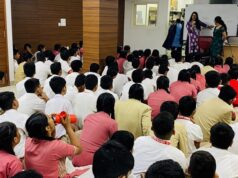Surbhi Tandon and Udita Singh
It is important that a young child grows to think beyond the confines of the four walls of a classroom. Stephen Spender, in his poem, ‘An Elementary School Classroom in a Slum’, stresses on the liberation of children away from classrooms:
‘Unless, governor, teacher, inspector, visitor,
This map becomes their window and these windows
That shut upon their lives like catacombs,
Break O break open ’till they break the town
And show the children green fields and make their world
Run azure on gold sands, and let their tongues
Run naked into books, the white and green leaves open
History is theirs whose language is the sun.’
Imagine our school going children, often seen with back-breaking school bags, in the absence of textbooks, learning concepts by visiting local markets, collecting coins of various historical dynasties and going on study excursions. They witness a world beyond Shakespeare and the Sciences. This is exactly what is underway in Chennai’s state government schools, where in absence of textbooks children are learning by such creative means.
The focus of Indian education system has unfortunately been on textbooks and rote learning since time immemorial. A textbook is a resource tool for initiating the learning process but for Indian classrooms it has merely become a way of acquiring knowledge. Paulo Freire, a Brazilian educator calls such a system the ‘Banking Model of Education’ in which the student is viewed as an empty account to be filled by the teacher. He observes that it transforms students into receiving objects, while attempting to control thinking and action, leading men and women to adjust to the world. This inhibits their creative power. Such a system not only hampers the process of critical and creative thinking but also creates a wedge between the texts and real world outside.
Often, teachers believe that a teacher-centric approach would be best for children. This belief requires a rethink. The approach should rather be learner-centric and must ensure learner autonomy. Four walls should be interchanged with learning in a larger social context. It is important that a child knows which civic bodies reside in his locality and where they are to be located rather than merely learning about their roles and functions.
What we need is a system that encourages children to analyse people, events and ideas and to discriminate and judge for themselves. Knowledge ought to be connected to life outside school. The Central Board of Secondary Education (CBSE) has in the past advised schools to train kids to appreciate architecture, analyse paintings, feel the textures of terracotta and wonder at how textiles are designed or how musical instruments are crafted, as part of their history sessions rather than just restrict themselves to textbook chapters and exams related to them. Also, there is an urgent need to for education reforms at a national level and the time has never been more so fundamental when there is a glaring need for resource-based education. Encouraging learning shifts away from rote is another area that needs focus.
Oscar Wilde once said, ‘Education is an admirable thing, but it is well to remember from time to time that nothing that is worth knowing can be taught.’ Ponder. What we need is innovation in education, the way is funded, the way its produced, both in the government and private system.
Post Disclaimer
The opinions expressed in this essay are those of the authors. They do not purport to reflect the opinions or views of CCS.





